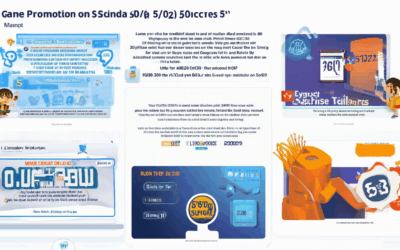In today’s rapidly evolving gaming landscape, open-source game tools have emerged as a transformative force, empowering developers to create innovative and customizable experiences. These versatile tools not only democratize game development but also foster collaboration and experimentation, enabling creators to push boundaries and deliver unique gameplay. From leveraging cutting-edge frameworks to harnessing powerful engines, open-source solutions offer unparalleled flexibility and cost-effectiveness, making them indispensable for both seasoned professionals and newcomers alike. As the demand for personalized and interactive games grows, open-source tools are poised to play a pivotal role in shaping the future of gaming, driving innovation and redefining player expectations.
Key Takeaways
– Diverse Tools for Every Need: Access a wide range of open-source game development tools tailored for 2D, 3D, and multiplayer games.
– Cost-Effective and Flexible: Create high-quality games affordably with free or low-cost tools that allow for customization and innovation.
– Community-Driven Support: Join passionate communities for guidance, troubleshooting, and access to cutting-edge features.
– Innovation and Growth: Stay ahead with tools that evolve rapidly, driven by contributor innovations and updates.
– Specific Solutions for Complex Tasks: Utilize specialized tools for physics, rendering, animation, audio, and networking to enhance your projects.
– Customizable and Sustainable: Modify tools to fit your needs and rely on a supportive ecosystem for long-term success.

Best Open-Source Game Development Tools
Whether you’re working on a 2D or 3D project, there are plenty of open-source game development tools available to help bring your ideas to life. These tools offer flexibility, customization, and robust features to suit both beginners and experienced developers.
- 2D Game Development
- GameMaker Studio – A popular choice for creating 2D games with a user-friendly interface and extensive asset library.
- Phaser.js – A powerful JavaScript framework for building 2D games with support for multiple platforms and frameworks.
- Unity – While primarily known for 3D games, Unity can also be used for 2D development with its lightweight version.
- Godot – An open-source game engine designed for 2D and 3D games, known for its strong community support and ease of use.
- 3D Game Development
- Unity – A leading 3D game development platform with extensive tools and ecosystem.
- Unreal Engine – Known for its high-end 3D rendering capabilities and used widely in game development.
- Blender – A free 3D modeling and animation software often used alongside game engines.
- Godot – Supports both 2D and 3D development with a focus on performance and simplicity.
- Multiplayer and Social Features
- GameMaker Studio – Offers built-in support for multiplayer functionality through its scripting options.
- Unity – Provides tools for creating multiplayer experiences with Unity Network.
- Unreal Engine – Offers robust multiplayer capabilities and support for online gaming.
- Godot – Supports multiplayer through plugins like the Multiplayer API.
- Additional Resources
- Indie Dev Games – A comprehensive hub for game development resources, tutorials, and community support.
- Open Game Hub – A website dedicated to showcasing open-source games and development tools.
- GitHub – Home to numerous open-source game engines and development libraries.
Elevate your game development process by exploring these open-source tools and leveraging the power of community support and endless possibilities. Start creating today and join the vibrant world of game development!
Key Benefits of Using Open-Source Game Tools for Developers
- Flexibility: Open-source game tools allow developers to modify, customize, and adapt the software to fit their specific project requirements. This level of control enables experimentation and ensures that the final product aligns perfectly with the developer’s vision.
- Customization: With open-source tools, developers can deeply integrate custom features, scripts, and workflows. This level of customization is particularly valuable for creating unique game mechanics, visuals, and user experiences.
- Community Collaboration: Open-source projects often foster collaboration among developers. By contributing to and learning from the broader community, developers gain access to a wealth of knowledge, resources, and best practices, accelerating their development process.
- Cost Efficiency: Many open-source game tools are free to use, reducing development costs. This allows smaller teams and indie developers to allocate more resources toward creativity and innovation rather than tool expenses.
- Access to Expertise: Open-source communities provide extensive documentation, tutorials, and forums where developers can seek help, share ideas, and learn advanced techniques. This collective intelligence significantly enhances productivity and problem-solving capabilities.
- Future-Proofing: Open-source tools are future-proof as they are constantly evolving with contributions from the community. Developers can easily upgrade their tools without switching platforms, ensuring their projects remain relevant and modern.
- Community Support: Open-source ecosystems often come with robust support systems, including forums, wikis, and active communities. This ensures developers have access to troubleshooting assistance and ongoing updates, minimizing development risks.
For more insights into the best tools and practices, explore our developer resources and discover how open-source solutions can transform your game development journey.

How Do Open-Source Game Tools Contribute to Innovation in the Gaming Industry?
Open-source game tools play a pivotal role in driving innovation within the gaming industry by democratizing access to game development resources, fostering collaboration, and enabling players to participate in the creative process. Here’s a breakdown of their contributions:
1. Democratizing Game Development
Open-source tools like those available on platforms such as Indie Dev Games empower independent developers and hobbyists to create games without the need for expensive software or programming expertise. These tools reduce barriers to entry, allowing anyone with passion to experiment and innovate.
2. Fostering Collaboration and Modding Communities
Open-source games often come with modding capabilities, enabling players and developers to customize and extend gameplay experiences. This collaborative environment has led to the rise of vibrant communities around games like Minecraft , where users create mods, maps, and custom adventures, driving continuous innovation and content expansion.
3. Accelerating Development Cycles
Access to source codes allows developers to rapidly iterate and test ideas. This iterative process speeds up the development cycle, enabling teams to release high-quality games more efficiently. Open-source frameworks like Unity and Unreal Engine provide developers with the tools to prototype and refine games quickly.
4. Enabling Customization and Personalization
Open-source tools give players unprecedented control over their gaming experience. From modifying game mechanics to creating custom levels, players can tailor their games to suit their preferences. This level of customization enhances engagement and keeps players invested in the gaming ecosystem.
5. Promoting Transparency and Trust
Open-source projects foster transparency, allowing players to inspect game code and understand how games are built. This transparency builds trust between developers and audiences, encouraging meaningful feedback loops that drive improvements and innovation.
6. Encouraging Community-Driven Content Creation
Open-source tools facilitate the creation of user-generated content, such as mods, skins, and custom levels. Platforms like GitHub host repositories of game assets and scripts, enabling developers to build upon existing work and share their creations with the world.
By leveraging open-source game tools, the gaming industry benefits from a diverse pipeline of innovative projects, a more inclusive development process, and a richer ecosystem of player-driven content. These tools not only accelerate game development but also empower players to become active participants in the creative process, driving the industry forward with fresh ideas and unique perspectives.

What Are the Best Open-Source Game Development Tools for Creating Diverse Games?
Indie game developers have access to a variety of open-source game development tools that cater to different needs and preferences. These tools not only offer flexibility but also provide cost-effective solutions for creating diverse games.
Top Open-Source Game Engines
- Godot Engine – A powerful, feature-rich game engine supporting multiple platforms and offering a wide range of built-in tools for game development. Learn more .
- Unity – While primarily known for its proprietary version, Unity offers experimental open-source versions for certain platforms. Explore Unity .
- Unreal Engine – Known for its advanced graphics capabilities, Unreal Engine provides open-source solutions for game development. Visit Unreal Engine .
- Pygame – Ideal for 2D games, Pygame is a popular library for Python, enabling the creation of games with ease. Check out Pygame .
- SFML – A versatile library for creating 2D and 3D applications, SFML is widely used for game development. SFML Resources .
- Phaser.js – Specializing in web-based games, Phaser.js is a great choice for creating browser-based games. Phaser.js Information .
Best Tools for Specific Game Development Tasks
- Physics Simulation – Bullet Physics and Box2D are widely regarded as top choices for implementing physics in games. Bullet Physics | Box2D
- Rendering – OpenCL and OpenGL ES provide excellent frameworks for rendering graphics. OpenCL | OpenGL ES
- Animation – SkiaSharp and SpriteKit are robust tools for creating smooth animations. SkiaSharp | SpriteKit
- Audio Processing – FMOD and irrKlang are excellent libraries for sound effects and background music. FMOD | irrKlang
- Multiplayer and Networking – enet and Network Coding are valuable for creating multiplayer experiences. E_net | Network Coding
These tools provide a solid foundation for game development, allowing creators to experiment with different technologies and deliver high-quality games across various platforms. Whether you’re working on 2D, 3D, or web-based games, there’s an open-source solution to suit your needs.
For more resources and guides, visit our Indie Dev Games platform and explore our comprehensive library of tutorials, reviews, and best practices for game development.
Advantages of Open-Source Game Tools for Developers
Open-source game tools provide developers with a powerful set of tools to create high-quality games while offering flexibility, cost savings, and access to a vibrant community. Here are the key advantages:
- Cost-Effectiveness:** Many open-source game tools are free, reducing development costs and allowing developers to focus on creativity and innovation.
- Flexibility:** Customize tools to meet specific project needs, with the ability to modify source code and add features not available in commercial versions.
- Community Collaboration:** Join active communities to access support, share knowledge, and contribute to ongoing projects, leading to faster development cycles and improved tools.
- Customization:** Tailor tools to exact specifications, enabling the addition of unique features and interfaces tailored to individual game requirements.
- Diverse Options:** Choose from a wide range of engines and tools, each suited for different project types, ensuring the best fit for developer needs.
- Community-Driven Support:** Access extensive documentation, tutorials, and community discussions to troubleshoot issues and learn advanced techniques.
- Long-Term Sustainability:** Open-source tools often continue to evolve through community efforts, ensuring longevity and preventing dependency on a single vendor.
- Innovation:** Benefit from rapid advancements as contributors continuously innovate, staying ahead of industry trends and providing cutting-edge solutions.
By leveraging these advantages, developers can efficiently create polished, innovative games while maintaining control over their projects and fostering a collaborative environment.

Open-Source Game Development Tools
Discover the top open-source game development tools perfect for creators! Whether you’re building 2D, 3D, or multiplayer games, these tools offer endless possibilities. Explore now!
- 2D Game Development:
- Unity – A popular choice for 2D and 3D game development, Unity offers a user-friendly interface and robust physics engines.
- Pencil2D – Ideal for pixel art and 2D animations, Pencil2D is lightweight and great for indie developers.
- Godot Engine – An open-source game engine known for its flexibility and ease of use, Godot supports both 2D and 3D games.
- 3D Game Development:
- Blender – A powerful 3D modeling and animation tool often used in game development, Blender is free and open-source.
- Unreal Engine – While not entirely open-source, Unreal Engine has a free version for hobbyists and small projects, offering realistic rendering and gameplay.
- 3ds Max – Known for its 3D modeling capabilities, 3ds Max is widely used in game development and offers a free trial version.
- Multiplayer Game Development:
- Photon Quantum – A real-time multiplayer engine designed for game developers, Photon Quantum simplifies online gaming development.
- OpenMMO – An open-source multiplayer server protocol used in various games, OpenMMO allows for seamless multiplayer experiences.
- Spine – A 2D game engine focused on physics-based animations, Spine is great for creating character interactions and gameplay mechanics.
- Additional Tools:
- Tilemap Editors – Tools like Tiled and Mapbox GL JS help in creating procedural terrain for games.
- Audio Engines – FMOD and Audacity are popular choices for adding sound effects and background music to games.
- Particle Systems – Tools like Particle.js and VEX are essential for creating dynamic visual effects in games.
These tools provide a solid foundation for game development, allowing creators to focus on innovation and creativity. Whether you’re working on mobile, desktop, or web-based games, there’s an open-source solution to fit your needs.
Explore more resources and learn how to get started with these tools on our Indie Dev Games platform .




0 Comments